
| DECEMBER, 2005 - VOLUME 13 NO.12 |
The Irrawaddy presents around three dozen profiles of those making headlines in Burma and abroad
R Zarni [Rock Singer]
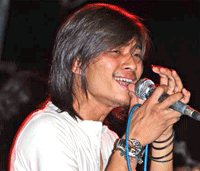 Another rising star in Burma’s hip hop scene, R Zarni, has turned his attention in recent years to the world of rock. His 2003 album “Ngart Kgo Chit Dae Thu” (You Who Love Me) has given him what he calls “survivable success.” The singer has also earned accolades for his collaborative efforts on albums and VCD concert performances with other celebrated acts. Industry observers attribute R Zarni’s popularity to his choice of “easy listening” cover songs and updated versions of popular songs from past decades, most of which have been mainstays on Burma’s top-ten lists for years. However one accounts for the singer’s success, R Zarni draws quite a crowd for his live performances, and his popularity is spreading in Burma’s pop and rock communities.
Another rising star in Burma’s hip hop scene, R Zarni, has turned his attention in recent years to the world of rock. His 2003 album “Ngart Kgo Chit Dae Thu” (You Who Love Me) has given him what he calls “survivable success.” The singer has also earned accolades for his collaborative efforts on albums and VCD concert performances with other celebrated acts. Industry observers attribute R Zarni’s popularity to his choice of “easy listening” cover songs and updated versions of popular songs from past decades, most of which have been mainstays on Burma’s top-ten lists for years. However one accounts for the singer’s success, R Zarni draws quite a crowd for his live performances, and his popularity is spreading in Burma’s pop and rock communities.No [Female Pop Group]
If there is one girl band that can be said to have rocked 2005, it is No. The sexy trio’s second album has proved a massive hit, and their live shows have been just as successful.

The girls—Yi Mon, Yadana and Thazin—are regulars on billboard hoardings and TV adverts, and with the recent release of a new album and VCD, their stock couldn’t be higher. In an era when Burmese girl bands come and go in the blink of an eye, No look like they will hang around longer.
Tun Tun [Hip Hop Singer]
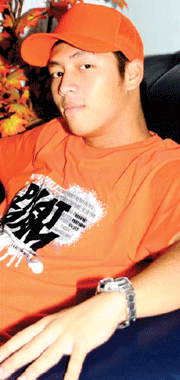 Finally he manages to squeeze his way out of the crowd and climb up onto the Mandalay stage. As the first song kicks in, the thousands of already screaming fans go wild. This is Tun Tun, who together with his band The Examplez, was one of the Burmese hip hop world’s smash hits of 2005.
Finally he manages to squeeze his way out of the crowd and climb up onto the Mandalay stage. As the first song kicks in, the thousands of already screaming fans go wild. This is Tun Tun, who together with his band The Examplez, was one of the Burmese hip hop world’s smash hits of 2005.While his early songs carried strong social messages, one of them raising awareness about the issue of HIV/AIDS, Tun Tun is now more concerned with pure entertainment, even taking the leading role in several of last year’s most popular movies.
A deeply religious young man in his early twenties, Tun Tun takes his status as role model seriously, shunning the traditional trappings of pop stardom. “I try to forget evil temptations and focus my mind on work,” he says. “I don’t drink alcohol when I have bitter feelings, but write more poems, and listen to and compose songs.”
Maung Myo Min [Film Director]
Maung Myo Min (Yintwin-Phyit) is perhaps Burma’s most popular film director. In 2005, when the ruling junta banned the sale and distribution of foreign movies, Maung Myo Min felt compelled to plead with the authorities to reconsider, or at least relax, the ban.
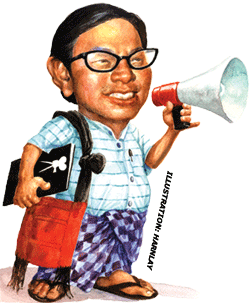 “I understand the authorities’ concern that foreign films might corrupt our youth—but I think we should find a way to block pornographic films and such, instead of imposing a sweeping restriction,” Maung Myo Min, 42, told The Irrawaddy. “As self-taught directors, we have learned to improve ourselves and try catching up with neighboring countries by watching international movies. When this source of exposure is shut off, it will be a great disadvantage for [Burma’s] film industry.”
“I understand the authorities’ concern that foreign films might corrupt our youth—but I think we should find a way to block pornographic films and such, instead of imposing a sweeping restriction,” Maung Myo Min, 42, told The Irrawaddy. “As self-taught directors, we have learned to improve ourselves and try catching up with neighboring countries by watching international movies. When this source of exposure is shut off, it will be a great disadvantage for [Burma’s] film industry.”As the restriction on foreign films came into effect, Maung Myo Min seized the opportunity to urge the military’s censor board to help resurrect the nation’s forgotten genre of ghost films. After successful lobbying, the director filmed The Night of the Ghost Busters, a movie aimed at both domestic and international audiences.
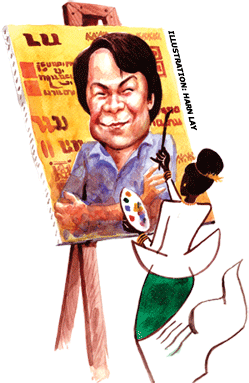 Nay Myo Say [Artist]
Nay Myo Say [Artist]Renowned Rangoon painter Nay Myo Say, who studied under impressionist master U Lun Gywe, has developed a unique style, setting him apart from others of his generation. Now in his late thirties, Nay Myo Say recently won great acclaim for “Dancers,” a series of mixed collages in which he captures the essence of classical Burmese dance and religious devotion.
Using original black and white photographs and several layers of fluid acrylic paint, the collages portray a young female dancer performing and offering prayers to Buddha. Nay Myo Say says his work is a kind of “Natri Puja”, a Pali term meaning to worship through art. Since 1995, Nay Myo Say’s art work has been exhibited in Burma and abroad in Singapore, Indonesia and London.
88-Generation Students Group [Burmese Student Leaders]
In early September, a group of former Burmese student leaders, under the name 88-Generation Students, called for cooperation between the ruling military junta and opposition parties to create the right environment for attracting and coordinating the flow of international humanitarian aid to people in distress.
A statement issued by the group—comprising well-known former political prisoners such as Min Ko Naing, Ko Ko Gyi, Htay Kywe, Min Zeya and Zaw Min—came out about a month after the withdrawal of international aid donor Global Fund from Burma, where HIV/AIDS, TB and malaria remain potentially pandemic threats to the country’s population.
Min Ko Naing, the group’s leader, emphasized that while national reconciliation is still a priority in resolving the country’s fundamental problems, the group believes that finding common ground among all concerned parties in Burma to address humanitarian crises would provide a window of opportunity for further cooperation and eventual reconciliation.
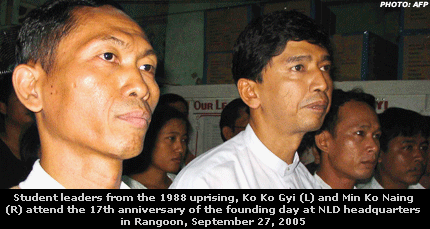
Almost all political groups inside and outside Burma welcomed the group’s statement. Paulo Sergio Pinheiro, the UN’s special rapporteur for human rights in Burma, said that the 88-Generation Students’ statement “must be warmly welcomed” in an address to the 60th session of the UN General Assembly in New York on October 27.
Burma’s ruling junta, however, brushed the statement off in a press conference in October. Burma’s Minister of Information Brig-Gen Kyaw Hsan dismissed it as an attempt by student leaders to make a name for themselves. He added: “It was aimed at attacking the Government by the internal and external destructive elements in synchronization, as if they were eager to serve the public interests.”
Since then, the student group has felt increasing pressure from authorities. Ko Ko Gyi, considered the chief strategist of the group, refused to make any comment on the regime’s hostile reaction. “We don’t want to get into a tit-for-tat vicious cycle,” Ko Ko Gyi told The Irrawaddy.
Many observers, including foreign experts, consider the actions of the 88-Generation Students mature and significant. Many also suspect that the group will play a major role in breaking the country’s political deadlock. In addition, the group has taken on numerous civic responsibilities. Student leaders frequently visit family members of political prisoners to give moral support. In recent months, members of the group have participated in political events sponsored by the National League for Democracy, attended the trial of human rights activist Su Su Nway, and contributed to social activities such as book fairs and art exhibitions.
Min Ko Naing [Student Leader]
Min Ko Naing, the most prominent leader of the 88-Generation Students, and one of The Irrawaddy’s People of 2004, has been further recognized by the international community in 2005 with the awarding of the 2005 Civil Courage Prize by the Trustees of the Northcote Parkinson Fund.
The award was given for his “steadfast resistance to evil at great personal risk.” Min Ko Naing, who endured 15 years of imprisonment by the military junta until his release in November 2004, could not attend the award ceremony, but he sent a personal message that was conveyed via several exiled media groups.
Min Ko Naing told The Irrawaddy that the people of Burma must have the courage to say no to injustice and yes to the truth. They must also work to correct their own wrongdoing that hurts society. “Physical bravery without moral and civic courage is likely to become abusive bullying.”
Charm Tong [Exiled Activist]
Few members of the Burmese opposition in exile would ever expect an invitation to meet the world’s most powerful man. Yet that is exactly what happened to Charm Tong, an acclaimed human rights activist from Burma’s Shan State. US President George W Bush spent nearly an hour with her on October 31 at the White House. “I think it is very important for me to take this opportunity to raise not only the voice of suffering but also the hope of the people,” Charm Tong said following the meeting. President Bush’s outspokenness on Burma in recent weeks has been attributed by some lobbyists in Washington to “the Charm Tong Effect,” suggesting that the young activist’s appeal on behalf of her people had struck a chord with the president.
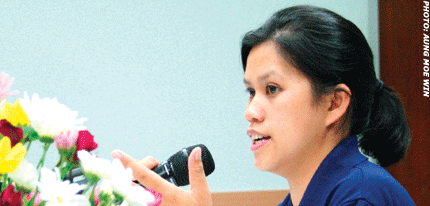
Born in Burma’s central Shan State and raised in northern Thailand, Charm Tong, 24, began her human rights activities at the age of 16 when she joined the Shan Human Rights Foundation. A year later, she testified before the UN Commission on Human Rights about the situation among ethnic Shan in Burma, during which she recounted her personal experiences of suffering and those of other embattled Shan refugees, who have neither official refugee status nor support from Thai authorities.
At 18, Charm Tong co-founded the Shan Women’s Action Network, which made headlines in 2002 by releasing a report that documented rapes committed by Burmese soldiers against ethnic minority women in Shan State. SWAN has been involved with numerous projects since its creation, including efforts to assist ethnic Shan women trafficked to Thailand and forced to work in the country’s booming sex industry, a program that offers counseling to victims of rape and educational initiatives for Shan refugees.
In the last five years, Charm Tong has traveled widely to expose the ongoing exploitation of women and children in Burma and Thailand. She is fluent in English, Thai, Mandarin and her native Shan, and her effectiveness as a human rights campaigner has increasingly attracted the attention of the global community. In 2004, Charm Tong was named one of the “Women of the World” by Marie Claire magazine; this year she received Reebok’s Human Rights Award, and Time magazine included her on a list of “Asian Heroes.”
Su Su Nway [Human Rights Defender]
When Su Su Nway successfully sued a Burmese local authority and saw four village headmen jailed for employing forced labor, she predicted that retribution would follow.
 “The local authorities will do everything to ruin my life,” she told the foreign shortwave radio station Democratic Voice of Burma. Su Su Nway, 34, is now in prison herself, condemned in October to serve 18 months for allegedly threatening and swearing at local authorities.
“The local authorities will do everything to ruin my life,” she told the foreign shortwave radio station Democratic Voice of Burma. Su Su Nway, 34, is now in prison herself, condemned in October to serve 18 months for allegedly threatening and swearing at local authorities.In a courtroom packed with her supporters, she vigorously denied the charge. “I neither swore at nor threatened them. I feel that they are accusing and suing me unfairly in this way and that there is no truth [in their allegations]. As a Burmese Buddhist girl, I would not do such things as they said I did in front of their houses.” A native of Htan Manaing, Rangoon Division, she is youth leader there of the opposition National League for Democracy.
Her trial, on apparently trumped-up charges, is seen not only as an act of vengeance by the authorities but as a defiant slap in the face for the International Labour Organization, which had hailed her successful campaign to bring to justice the four village headman accused of forcing people to work against their will. The ILO protested against her conviction and sentencing.
A campaign of official harassment preceded Su Su Nway’s trial. She needs regular medical attention for a heart condition, and a local nurse was allegedly prevented from treating her. There are also reports that she is being denied medication in prison.
Su Su Nway was always aware of the fate that awaited her, telling DVB radio: “They [the authorities] will try to send me to prison one way or another. If I go to prison on that day, I want to say to people who are subjected to forced labor not to feel dejected. You will be afraid like me but I want you to open your eyes and continue to carry out your duties.”
Three hundred of her supporters gathered outside the court house when she was driven off in a prison van. They included NLD members, well-known student leaders—and the villagers whose rights she so bravely defended.
Hnin Sandar [Defiant Widow/Activist]
The widow of NLD youth member Aung Hlaing Win, Hnin Sandar has vowed to dedicate her energies to uncovering the true circumstances of his death while under interrogation.
 Aung Hlaing Win was arrested by intelligence agents in early May 2005 at a suburban Rangoon restaurant. Ten days later, an army officer called on his wife, Hnin Sandar, and informed her he had died from a heart attack while being interrogated.
Aung Hlaing Win was arrested by intelligence agents in early May 2005 at a suburban Rangoon restaurant. Ten days later, an army officer called on his wife, Hnin Sandar, and informed her he had died from a heart attack while being interrogated.Hnin Sandar took up the case with a local court, which insisted her husband had not been a healthy man and had died from “natural” causes. A doctor told the court, however, that he had found 24 injuries, including bruises, on Aung Hlaing Win’s body.
Hnin Sandar, assisted by an NLD legal team, then approached a higher court, which rejected their appeal for a reinvestigation of the case. Hnin Sandar vowed not to give up her search for the truth, backed now in her determined stand by Amnesty International.
Aung Din [Exiled Activist]
When Burmese opposition groups claim that the country’s ruling junta holds its population of some 54 million as hostages, skeptics may dismiss it as little more than exaggerated rhetoric. For Aung Din, a former political prisoner and co-founder of a Washington-based lobby group, the claim carries more weight; particularly after hearing the news that the junta had arrested every member of his family, except his octogenarian grandfather.
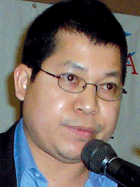 In the aftermath of deadly bomb attacks in Rangoon last May, the government—having no clues to the identities of the bombers—began interrogating the families of exiled dissidents who were outspoken critics of the military government. Aung Din’s family quickly became targets of Burma’s revamped intelligence agency, which detained his mother, sister and brother in an undisclosed location for several days. They were later released after foreign media organizations reported on the arrests.
In the aftermath of deadly bomb attacks in Rangoon last May, the government—having no clues to the identities of the bombers—began interrogating the families of exiled dissidents who were outspoken critics of the military government. Aung Din’s family quickly became targets of Burma’s revamped intelligence agency, which detained his mother, sister and brother in an undisclosed location for several days. They were later released after foreign media organizations reported on the arrests.According to information received by The Irrawaddy, members of Burma’s thuggish Union Solidarity and Development Association distributed posters with Aung Din’s picture throughout Rangoon, identifying him as a suspect in the bomb attacks. The posters also included the names of his family members, who were thus implicated with Aung Din as suspects without any supporting evidence. As a result, their safety—as well as their reputations—was put at considerable risk
“I felt so bad for my family members,” said Aung Din, the policy director at US Campaign for Burma. “But I hope they would understand that I never get involved in violent activities. This is the military’s hostage-taking harassment.” Given his past affiliations in Burma, it is not surprising that the junta has targeted him. Now in his early 40s, Aung Din was once a student union leader and colleague of prominent student leader Min Ko Naing during the 1988 uprising.
Aung Din was arrested in early 1989 and spent more than four years in prison. Following his release in 1993, he completed his studies in engineering and left Burma. He spent several years in Singapore before moving to the Thai-Burma border in 2000 to join the Assistance Association for Political Prisoners. A year later, he arrived in the United States to work with the Free Burma Coalition.
A dispute with FBC founder Dr Zarni over the group’s policy on Burma led Aung Din and American activist Jeremy Woodrum to leave the group in 2003 and form their own organization, the US Campaign for Burma. Zarni would later reverse his previous position on Burma by coming out against economic sanctions, criticizing democratic opposition leader Aung San Suu Kyi and traveling to Rangoon to meet with the country’s ruling generals.
USCB efforts—particularly its international campaign to celebrate Suu Kyi’s 60th birthday—have demonstrated how coordinated action around the world can make the Burmese junta vulnerable and focus media attention on opposition activities. Aung Din, considered by many to have close ties with the political establishment in Washington, often appears on short wave radio broadcasts. While some critics have branded him a hardliner, Aung Din says that he is simply a “principled activist” working in exile for the benefit of the opposition movement in Burma.
Aung San Suu Kyi [Opposition Leader]
Since her detention in 2003 after her convoy was attacked by thugs backed by the junta, pro-democracy leader Aung San Suu Kyi has been silent (read: silenced) and cut off from all communication with the outside world.
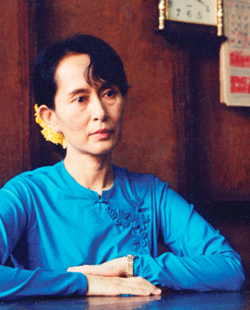 At first she was held in an undisclosed detention center before being confined under house arrest. In late November 2005—the year of her 60th birthday—the house arrest order was extended by another year.
At first she was held in an undisclosed detention center before being confined under house arrest. In late November 2005—the year of her 60th birthday—the house arrest order was extended by another year.Out of touch with her supporters and the general public, Suu Kyi may have suffered a fall in popularity, but she is still a focus of national attention. The irony is that if she were to vanish from the public domain, if indeed she were to be forgotten, the regime would in all likelihood release her. As it is, she remains a symbol of the democracy movement and poses an enduring threat to the paranoid regime.
Contacts were established and lines of communication opened between her and government liaison officers in 2004, just before the resumption of the military-sponsored National Convention. Since the downfall of former prime minister and intelligence chief Khin Nyunt, no one has been assigned to the role of liaison officer between Suu Kyi and the government.
It’s a lonely life for Suu Kyi in her heavily guarded lakeside home in Rangoon. Police and intelligence officials seal off the road in front of her house, which stands forlornly behind a fence festooned with NLD banners. Only her physician is allowed to pass regularly through the cordon.
In her previous terms of house arrest, UN special envoys and family members were allowed to visit her, and through them she was able to send out messages to the outside world—political statements and also descriptions of her health and state of mind.
The Peopls who Speak of NLD
Unlike in the year 2004, when the embattled National League for Democracy endured as much friendly fire as enemy aggression and was wracked by the controversial dismissal, suspension and demotion of its radical members, the opposition party in 2005 enjoyed greater stability and a better image. But none of the NLD’s usual critics, Burmese as well as foreigners, appears to recognize this development.
Progress was especially notable in early 2005 with the appointment by the party’s octogenarian leadership of five outspoken second-liners as NLD media contacts. Interestingly, unlike most NLD founders, many of those who have now risen to prominence were not involved in politics before the 1988 pro-democracy uprising. They have their stories of commitment to tell.
“The 1988 movement transformed my life,” says Myint Thein, the NLD’s successful candidate in the 1990 election, representing Kyaikmayaw Township in Mon State. He is now one of the party’s most articulate spokespersons.
An officer of the Co-operative Ministry from the 1970s until the late 1980s, Myint Thein was forced to retire from his job because of his involvement in 1988 demonstrations against the so-called socialist government. He then helped found the NLD’s Kyaikmayaw Township office.
Myint Thein has endured four terms of imprisonment and detention, including nearly three years in a detention center without trial. He was sent to the detention center in 1998 after joining the NLD headquarters two years earlier to assist Aung San Suu Kyi.
“Daw Suu’s moral integrity and treatment towards us have had a tremendous impact on me,” says Myint Thein, who acted as the NLD leader’s personal driver in the late 1990s.
Now in his 60s, Myint Thein gets along with the NLD’s elderly leaders, who are regarded by some of the younger members as authoritarian and lacking in strategic vision. “We, the younger, should learn from the experiences of older leaders,” he told The Irrawaddy. “Given the serious repression [existing in Burma], we cannot proceed alone without the prudential guide of our ‘uncles’.”
Nyan Win, another outspoken NLD second-liner, agrees with Myint Thein. “I don’t think the ‘uncles’ are blocking younger members’ way,” says Nyan Win, who was the NLD’s successful candidate in the 1990 election, representing Paung Township in Mon State. He is now a member of the party’s legal team.
“The most important thing is that we have to cooperate with elder leaders and build trust to bridge the generation gap,” Nyan Win says.
To Nyan Win, 1988 was a turning point in his life. He had worked as a government prosecutor since 1973, but was then forced to retire in 1988 after joining the All Law Office Workers Union and protesting against the socialist regime. In 1998, he was detained along with several other NLD election candidates and held for some three years.
Nyan Win legally represented Suu Kyi in a case arising from an incident at her Rangoon lakeside home in May 2002, when she was allegedly attacked by her cousin. She was given a suspended prison sentence after refusing to pay a fine of 500 kyat (US 50 cents), claiming she was being unfairly treated.
The case won Nyan Win wide media attention, and in early 2005 the NLD selected him as one of its five spokespersons. He is noted for his confidence and precision in handling the media, particularly on legal issues.
Now in his 60s and lacking a pre-1988 political background, Nyan Win sees Suu Kyi, Tin Oo and Aung Shwe as his mentors. He complains that he and some of his comrades are being dismissed as the “yes men” of the party elders—”Whenever I have a chance, I explain to those who misconstrue me as a sycophant that what I am now doing is just to serve the party and the troubled people with my professional legal expertise,” he says.
Cin Sian Thang [Ethnic Leader]
After a close colleague and leader of the Shan Nationalities League for Democracy, Hkun Htun Oo, was arrested in February 2005 and given a 93-year prison sentence, Cin Sian Thang resolved to increase his efforts to fight for national reconciliation through political dialogue.
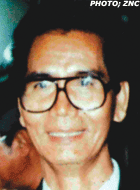 Cin Sian Thang, 67, is chairman of the ethnic Chin Zomi National Congress. Elected as a Member of Parliament during Burma’s ill-fated 1990 elections, he has worked diligently for many years in defiance of the country’s ruling junta. During the 1960s, Cin Sian Thang served as a leader of the Chin Ethnic Student Union while a student at Rangoon University. He has been imprisoned on at least six occasions by successive military regimes for his political activities between 1972 and 1999. In each instance, he served two years, during which he was subjected to brutal interrogations that led to permanent health problems.
Cin Sian Thang, 67, is chairman of the ethnic Chin Zomi National Congress. Elected as a Member of Parliament during Burma’s ill-fated 1990 elections, he has worked diligently for many years in defiance of the country’s ruling junta. During the 1960s, Cin Sian Thang served as a leader of the Chin Ethnic Student Union while a student at Rangoon University. He has been imprisoned on at least six occasions by successive military regimes for his political activities between 1972 and 1999. In each instance, he served two years, during which he was subjected to brutal interrogations that led to permanent health problems.The Zomi National Congress won two parliamentary seats for Chin State in 1990, but two years later the military government revoked the party’s registration. Nonetheless, the ethnic activist has never yielded to pressure or given up his hope of a unified and federal democratic Burma. In the absence of Hkun Htun Oo, Cin Sian Thang has become the most outspoken elected ethnic leader in Burma. He serves as a member of the Committee Representing People’s Parliament, a group supported by 251 candidates elected in 1990. Considered a moderate ethnic leader, Cin Sian Thang heavily promotes the CRPP as a rallying point for Burmese activists and ethnic leaders.
Sao Surkhanpha [Exiled Activist]
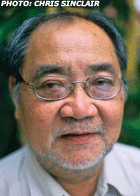 In April 2005, Sao Surkhanpha and a group of elderly Shan activists in exile surprised Burmese government officials, exile opposition groups and armed ethnic forces operating in northern Burma by declaring the independence of Shan State. Sao Surkhanpha, 67, is the eldest son of Burma’s first president, Sao Shwe Thaike, and claims the title of President of the Federated Shan States from his home in Canada. However, Sao Surkhanpha is considered “politically irrelevant” by many in the exile community, and Burma’s main democratic opposition party National League for Democracy has strongly criticized his call for secession.
In April 2005, Sao Surkhanpha and a group of elderly Shan activists in exile surprised Burmese government officials, exile opposition groups and armed ethnic forces operating in northern Burma by declaring the independence of Shan State. Sao Surkhanpha, 67, is the eldest son of Burma’s first president, Sao Shwe Thaike, and claims the title of President of the Federated Shan States from his home in Canada. However, Sao Surkhanpha is considered “politically irrelevant” by many in the exile community, and Burma’s main democratic opposition party National League for Democracy has strongly criticized his call for secession.Ludu Sein Win [Veteran Journalist and Social Critic]
“Western policy makers and scholars should be really careful not to find solutions for Burma by extrapolating their ready-made theories and experiences in other parts of the world. Burma’s situation is unique.”
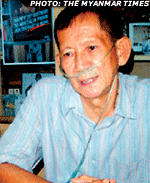 So says Ludu Sein Win, 65, a veteran Burmese journalist well-respected in Rangoon, but who has experienced his fair share of troubles at the hands of the country’s ruling dictators. He began his distinguished career as a young reporter for Upper Burma’s left-wing Ludu (the People) newspaper, launched in 1946. He later became the publication’s Rangoon bureau chief.
So says Ludu Sein Win, 65, a veteran Burmese journalist well-respected in Rangoon, but who has experienced his fair share of troubles at the hands of the country’s ruling dictators. He began his distinguished career as a young reporter for Upper Burma’s left-wing Ludu (the People) newspaper, launched in 1946. He later became the publication’s Rangoon bureau chief.Gen Ne Win closed Ludu in 1967, and the young bureau chief, then 27, was arrested and sentenced without trial to 13 years in prison, during which family members were prohibited from visiting. Ludu Sein Win spent an additional two years confined on Coco Island, some 270 miles southwest of Rangoon in the Indian Ocean.
In 1980, Ludu Sein Win was released and suffered a stroke that left the right side of his body paralyzed. Unwilling to give in to his ill-health, he learned to write with his left hand and continued to publish articles and books. He also began holding private English language lessons for interested students.
In the wake of the 1988 popular uprising, the number of journals and magazines in Burma mushroomed. Since that time, Ludu Sein Win has contributed regularly to more than a dozen of them using as many as 15 different pen names. His writings focus on the essentials of journalism, societal ethics and youth empowerment, and his work has exerted a noticeable influence on the country’s young generation of activists and journalists.
Though often bedridden and forced to rely on an oxygen mask because of his poor health, Ludu Sein Win still speaks freely, and sometimes controversially, about Burma’s current affairs in shortwave radio interviews. “Western experts tend to impose their view of the Burmese military in terms of the ‘hardliner vs moderate’ model,” Ludu Sein Win told The Irrawaddy. “But it is irrelevant in our unique case.”
“I don’t believe in any appeasement approach to the bully, or that the model of elitist democratic transition will work for our country. My experience teaches me that unless you have got people power, no change can be sustainable or even desirable.”
Eleven Media Group [Media]
Eleven Media Group and its publications are perhaps the most successful media business in Burma. Their success story began with the First Eleven sports journal, established in 2001 and which specializes in coverage of soccer. Its considerable popularity received a boost from an unexpected quarter in July 2003 when its highly respected editor, Zaw Thet Htwe, was arrested at his Rangoon office and later convicted of high treason.
 The case against Zaw Thet Htwe rested on a never substantiated assassination plot, although his arrest followed the publication by First Eleven of a report questioning the use of an international donation of US $4 million to promote football in Burma. The regime denied that the prosecution of Zaw Thet Htwe had anything to do with his journalistic work.
The case against Zaw Thet Htwe rested on a never substantiated assassination plot, although his arrest followed the publication by First Eleven of a report questioning the use of an international donation of US $4 million to promote football in Burma. The regime denied that the prosecution of Zaw Thet Htwe had anything to do with his journalistic work.Zaw Thet Htwe was convicted of high treason and sentenced to death, but the sentence was later commuted to three years imprisonment. First Eleven was allowed to continue publishing.
Following international pressure for his release, Zaw Thet Htwe was freed in January 2005, and he returned to find his magazine enjoying phenomenal success, each issue selling 120,000 copies. Rival publications are selling around 50,000.
Three sister publications have now been launched: Premier Eleven, International Eleven and Weekly Eleven.
Credit for the Eleven Media Group’s success must also go in large measure to its chief executive officer, Dr Than Htut Aung, a physician-turned-businessman. The young entrepreneur, still in his early 40s, is widely respected for his innovative ideas and management skills.
In contrast to many other Burmese media groups and journals, Than Htut Aung invests heavily in human assets, offering unprecedented salaries of up to $200 a month to his journalistic staff, and unleashing a big debate on pay conditions in Rangoon media circles.
Reporters from the Eleven Media Group travel as a matter of routine with the national football team wherever it plays, publishing first-hand reports on its matches. Than Htut Aung’s own articles, printed under the pseudonym Man Ball-Lone, are particularly popular.
Burma’s inveterate gamblers like the group’s soccer journals because of their in-depth coverage and uncannily accurate predictions of international match results.
“The popularity of First Eleven lies in its relatively correct predictions of the possible outcomes of soccer games in Europe, and the journal has become a gambler’s handbook,” said one young businessman and regular reader.
Than Lwin Htun [Journalist]
While working part-time for the BBC Burmese Service in the 1990s, Than Lwin Htun heard about a Burmese student activist who had committed suicide in Thailand because of depression. The needless death struck a chord, and Than Lwin Htun used his radio show to play motivational Burmese songs and offer words of encouragement to listeners.
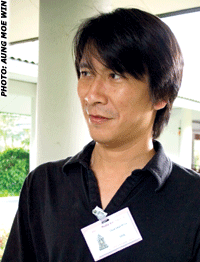 As the program ended, Than Lwin Htun felt satisfied with what he had done. The British chief of the Service, however, did not. Than Lwin Htun was given a stern warning for breaching journalism’s code of professionalism and ethics.
As the program ended, Than Lwin Htun felt satisfied with what he had done. The British chief of the Service, however, did not. Than Lwin Htun was given a stern warning for breaching journalism’s code of professionalism and ethics.“I was so upset, and that feeling lingered for some years,” recalls Than Lwin Htun, who has now become the Burmese service chief of the Voice of America radio service. He later came to agree that he had gone beyond his professional boundaries. “I was overtaken with sentimental attachment and I politicized my show,” says Than Lwin Htun. Since then, Than Lwin Htun has striven to maintain absolute professionalism, though he admits the impossibility of complete detachment. “The passion must be there as a journalist,” he says. “It fires our work.”
Than Lwin Htun’s is one of the success stories among the generation of student activists from the pro-democracy uprising of 1988. When those thousands of people took to the streets to demand change back in 1988, final-year medical student Than Lwin Htun, who was known then as Aung Naing, was a leading member of an underground student union, where he worked together with Min Ko Naing and other activists. When the military retook Rangoon, students fled to the Thai-Burma border to set up paramilitary organizations, Than Lwin Htun emerging as a founding member of the All Burma Student Democratic Front.
His underground activism did not last long, however, and in 1991 he resettled in London and began working for the BBC. He stayed with the Corporation until 2002, though found most pleasure in his advisory capacity at Thai-based Internews, a non-profit group which trains young journalists. As an Internews Burma Project trainer during 2002 and 2003, Than Lwin Htun helped to train more than 10 exiled Burmese groups.
“It was an awakening for many young people in exile, as they all thirst for journalism knowledge,” he says. “It was a most exciting time for me too, as I felt I could contribute to their needs.” Than Lwin Htun went on to help found the Internews Journalism School in Chiang Mai, Thailand, where students from diverse backgrounds can receive valuable training.
Than Lwin Htun moved to the US in early 2004, where he worked as program coordinator at VOA’s Burmese radio service. He became Service Chief in May 2005, helping to reinvigorate the station, which had long been known for its staid, old-fashioned approach to covering news.
The Burmese junta is never slow to point the finger at the BBC and VOA as culprits for their country’s instability. “If the Burmese authorities truly believe that we are biased and unfair,” Than Lwin Htun says, “they should give us access to them so that we can present their views as different opinions in our broadcast.”
Burmese Radio Service from Abroad [Media]
The role of the media is becoming increasingly influential in shaping Burmese politics, as more and more people inside Burma dare to speak to media outlets, especially short-wave radio programs.
Despites early doubts about its credibility, The Irrawaddy now sees the VOA Burmese Service as a progressive organization, heading in a promising direction. We also note the efforts of the exiled radio Democratic Voice of Burma, who strive to remain independent and have scored something of a coup with their twice-weekly television program. Beamed into Burma by satellite, DVB launched the one-hour program in May 2005, presenting news reports, features, educational programs on non-violent movements and entertainment shows.

The BBC’s Burmese Service, however, receives few accolades for its performance in 2005. After hailing its contribution to the flow of accurate and independent news into Burma in the two previous years, we have to report that it made some serious gaffs this year—among them, a dispatch that there had been a coup in Rangoon. Many listeners complained about the accuracy of the service, but the BBC turned a deaf ear. Burma’s Information Minister also accused the BBC of fabrication—and this time there might have been some basis to his charge.
The Burmese service of Washington-based Radio Free Asia might have been expected to overtake the popularity of the BBC in 2005, but its lack of professionalism took a toll. It has to be credited with providing relatively credible news and feature programs. But it earns low marks for its writing, editorial judgment, lack of consistency and poor voice delivery.
Than Shwe [Burma's Junta Supremo]
Burma’s most powerful general has ruled the country since 1992 and currently holds the government’s two highest posts—chairman of the State Peace and Development Council and commander-in-chief of the armed forces.
Many in Burma—including senior government officials—believe that the junta chief has grown increasingly out of touch with affairs of state, mentally unstable and extremely paranoid. It is also believed that he was principally responsible for the bizarre decision to relocate key government ministries to Pyinmana, central Burma, on the advice of his astrologers.
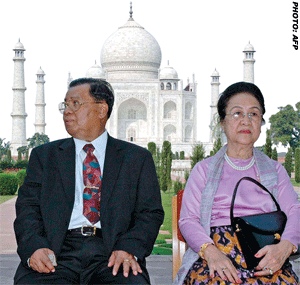 Some even say that Than Shwe—despite his as yet unchallenged hold on power in Burma—would gladly abandon his office for the position of president in a new civilian government.
Some even say that Than Shwe—despite his as yet unchallenged hold on power in Burma—would gladly abandon his office for the position of president in a new civilian government.The administrative capital of Burma may be moving north, but Than Shwe is staying put in Rangoon—in deference to his family’s reluctance to leave the city. He is said to desire a fleet of helicopters to shuttle him between Pyinmana and Rangoon when his attendance at cabinet sessions and upper-level meetings is required.
The senior general rarely makes public appearances. He occasionally meets visiting diplomats, who have discounted persistent rumors of the general’s poor health. Reports of mental instability notwithstanding, Than Shwe is still credited with considerable political acumen, as befits a former member of the country’s psychological warfare department. He is reported this year to have told high-ranking UN officials that he wants no interference by the UN or any nation—including China and Russia—in the internal affairs of Burma.
Than Shwe is living proof of the adage that behind every powerful man stands a woman. In his case, there are two women who dominate his thoughts and are capable of disrupting his schedule. One of them, Kyaing Kyaing, is his wife. The other is pro-democracy icon Aung San Suu Kyi—the very mention of her name is said to send the general into paroxysms of rage.
Kyaing Kyaing [Burma's First Lady]
Burmese supremo Snr-Gen Than Shwe’s wife, Kyaing Kyaing, is regarded in Burma as a Shakespearean Lady Macbeth figure, the real power behind the Rangoon throne. Her influence is apparently so strong that she is said to have blocked her husband’s wish to retire from active political life.
Much of what is written about her is based on rumor and hearsay, but the reports, from various sources, are so consistent that a large measure of credibility must be attached to them.
Kyaing Kyaing is an ethnic Pa-O and the widow of a senior army officer. That much is known—but then her life story enters the realm of hearsay. Even the circumstances of her army officer husband’s death are not officially recorded—he is reported to have died in action.
After marrying Than Shwe, she slipped behind the security curtain that shields Burma’s top leaders and their families from public attention. Nevertheless, enough is known about her from reliable sources to paint a picture of a forceful but superstitious woman who rules Than Shwe’s private and professional life.
A well-informed source in Rangoon says that when Than Shwe expressed a wish to retire from active political life, Kyaing Kyaing skillfully played a sentimental card, telling him he had to stay in office in the interests of his favorite grandson. “Kyaing Kyaing asked Than Shwe who else would take care of their grandson’s future,” the source said. The grandson, Pho La Pyeit, is a favorite of Than Shwe, who reportedly believes the boy is his talisman of good fortune.
Kyaing Kyaing is said to share her husband’s superstitious ways, and she has been seen sometimes taking on the role of a mystic medium. She clearly displays signs of delusions of grandeur, expecting people to address her as “your majesty” and to drop to their knees in her presence.
She is also said to harbor a strong hatred of National League for Democracy leader Aung San Suu Kyi, and there are those who suspect she had a hand in the mob attack on the pro-democracy activist and her supporters in May 2003.
Within the home, Kyaing Kyaing oversees the preparation of all her husband’s meals, according to a government official who has accompanied the couple on official trips in Burma. Nobody gets to meet Than Shwe without her approval.
Government and military appointments also have to meet with her approval, say informed sources. Her hire-and-fire influence reportedly nets her big rewards: luxury homes in new housing developments, business concessions and extravagant “New Year gifts.”
When one businessman’s wife presented her with a ruby worth 200 million kyat (US $18,000) Kyaing Kyaing is said (by a source close to the entrepreneur) to have dismissed the gem as “cheap.”
Burma’s business community say that as the Burmese New Year approached in April, Kyaing Kyaing demanded from them gifts worth at least 6 billion kyat ($5 million). “Daw Kyaing Kyaing told company owners not to regard the demand as extortion money or bribery, as it is the Burmese tradition to give presents to ‘worthy people’ during the New Year season,” reported the Oslo-based DVB radio.
Kyaing Kyaing’s cupidity—partly assuaged by shopping jaunts with her daughters to Singapore—appears finally to have alarmed her husband. He reportedly stepped in when his wife asked army officials to deliver to her a huge quantity of luxury goods confiscated from the home of sacked agriculture minister Nyunt Tin.
The disgraced minister was arrested on charges relating to a $10 million business scandal. A raid on his home netted more than 30 unlicensed cars and a treasure trove of gold and jewelry. But when Kyaing Kyaing asked her army cronies to deliver to her the confiscated goods, alarm bells reportedly rang at the top and Than Shwe intervened and countermanded her instruction.
Kyaing Kyaing seems to have taken her husband’s rare display of authority to heart, for she retired from public view for some time, although she remains honorary patron of the Myanmar [Burma] Women’s Affairs Federation.
Lt-Gen Myint Swe [Rangoon Commander]
The powerful new military intelligence chief, Lt-Gen Myint Swe, gained prominence after the ousting of former military intelligence boss and prime minister Gen Khin Nyunt in October 2004, and he seems to have been blessed by good fortune ever since. It is not surprising that cronyism is the order of the day in any authoritarian society. But in Burma, under its current military regime, it seems to have gone overboard.
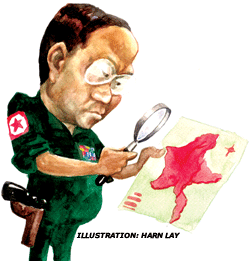 Newly-promoted Lt-Gen Myint Swe, commander of Rangoon Command and chief of the post-Khin Nyunt Military Affairs Security, the new military intelligence agency formerly known as DSI, has benefited from this. He was promoted to his current rank on October 20, despite any visible professional military merit.
Newly-promoted Lt-Gen Myint Swe, commander of Rangoon Command and chief of the post-Khin Nyunt Military Affairs Security, the new military intelligence agency formerly known as DSI, has benefited from this. He was promoted to his current rank on October 20, despite any visible professional military merit.When an unusual bomb campaign in three locations in Rangoon in May killed 21 people, with dozens injured, it was under Myint Swe’s watch.Yet he was still promoted. There were other reported bomb attacks in the country, including the second city of Mandalay. The regime has found no suspects for any of the attacks and, predictably, has blamed foreign-based opposition groups. Myint Swe was not found at fault for any security slip.
Myint Swe, who has a Mon ethnic background, became an army second lieutenant in 1973 when he graduated from the 15th intake of Rangoon’s Defense Service Academy. He rose quickly through the ranks, from commander of the 97th Infantry Battalion to commander of the 11th Light Infantry Division, an important post as the division provides security for Rangoon.
Though Myint Swe is often reported to be a nephew of Kyaing Kyaing, wife of junta supremo Snr-Gen Than Shwe, some military analysts in Rangoon say it is in fact not true. The general was close to Than Shwe’s family during his rise to the top, and Kyaing Kyaing appreciated his deferential approach.
As a promising divisional commander and a favorite of the first-lady to be, the then Brig-Gen Myint Swe took over as regional commander of the Southeast Command in 2001 when incumbent Thiha Thura Sit Maung died in a helicopter crash. He went on to take over the Rangoon Command and was promoted to major general.
When the junta purged Khin Nyunt, Myint Swe played a critical role in rooting out members of the former prime minister’s intelligence apparatus. Then he was given MAS’s chief position without giving up his Rangoon Command. Ironically, his most recent promotion coincided with the first anniversary of Khin Nyunt’s arrest. The promotion also made military history—Myint Swe is the first Burmese regional commander to rise above the rank of major general.
Maj-Gen Myint Hlaing [Northeast Region Commander]
To win respect in the Burmese military, you have to play hardball. And of the 12 regional commanders, it is the head of the Lashio-based Northeast Region, Maj-Gen Myint Hlaing, who plays hardest. Notoriously ruthless in dealing with ethnic groups, Myint Hlaing controls what is arguably the single most volatile region in Burma: Northern Shan State, home to no less than seven ethnic ceasefire groups, including the infamous drug-running United Wa State Army.
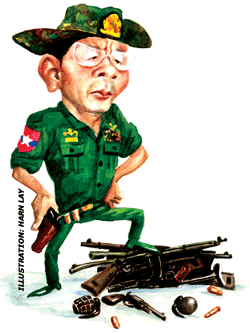 Myint Hlaing graduated from Rangoon’s Defense Service Academy in 1975, and went on to serve under current junta vice chairman Deputy Snr-Gen Maung Aye in the Eastern Command during the late 1980s. Bumped up to lieutenant colonel in 1994, Myint Hlaing was one of the first batch of military personnel sent to Nanjing, China, for officer training the following year. In 2001, he made major general and succeeded Maj-Gen Tin Aung Myint Oo as commander of the Northeast Region.
Myint Hlaing graduated from Rangoon’s Defense Service Academy in 1975, and went on to serve under current junta vice chairman Deputy Snr-Gen Maung Aye in the Eastern Command during the late 1980s. Bumped up to lieutenant colonel in 1994, Myint Hlaing was one of the first batch of military personnel sent to Nanjing, China, for officer training the following year. In 2001, he made major general and succeeded Maj-Gen Tin Aung Myint Oo as commander of the Northeast Region.Myint Hlaing came to widespread attention in 2004, when he alerted junta supremo Snr-Gen Than Shwe to corruption among intelligence officers under his watch in the China-Burma border town of Muse. This led to scores of arrests and, ultimately, the removal of then-prime minister Khin Nyunt.
Since early 2005, Myint Hlaing has come down hard on Shan groups working towards regional autonomy, orchestrating the arrest of several prominent leaders. Tension between the commander and Shan groups rose with the detention of Maj-Gen Sao Hso Ten, president of the Shan State Peace Council, on charges of treason.
Like his mentor, Maung Aye, Myint Hlaing is not a fan of ceasefire groups retaining their weapons and has a history of intimidating factions into surrendering arms, notably the Palaung State Liberation Organization and some divisions of the Shan State National Army and Shan State Army-North.
The junta proved its support of Myint Hlaing with the 106-year prison sentence handed to Sao Hso Ten in late November, and the hardline commander is being tipped for promotion in the next military reshuffle.
Daw Thissawaddy [Burmese Female Monk]
Daw Thissawaddy made headlines in July 2005 when she was arrested by Burmese authorities during a visit to Rangoon.
 Prior to her arrest, Daw Thissawaddy, 41, was a PhD candidate in religious philosophy in Sri Lanka, where she also received her ordination as a female monk, or bikkhuni, a common practice in the Sri Lankan tradition of Theravada Buddhism.
Prior to her arrest, Daw Thissawaddy, 41, was a PhD candidate in religious philosophy in Sri Lanka, where she also received her ordination as a female monk, or bikkhuni, a common practice in the Sri Lankan tradition of Theravada Buddhism.The practice of ordaining female monks no longer exists in Theravada Buddhism as practiced in Burma. In past centuries, however, the bikkuni sangha, or Order of Ordained Nuns, was a well-known and accepted feature of Buddhism.
Many scholars cite the date 456 AD to mark the decline of female ordination in Theravada Buddhism. However, inscriptions from the Pagan era (11th to 13th centuries) suggest the practice continued well beyond that date. According to the renowned scholar Than Tun (one of The Irrawaddy’s People of 2003), Burma’s female monks were venerated as highly as their male counterparts.
Several attempts have been made to reinstate the practice in the 20th century, most notably by Abbot Shin Adicca; all such efforts, however, have failed. Burma’s current military rulers view the issue of bikkhuni ordination as a criminal offense punishable by lengthy prison terms.
Prior to her arrest, Daw Thissawaddy had petitioned Burma’s Sangha Nayaka, the ruling council of the country’s monastic community, to reinstate female ordination, claiming that historical precedents supported such a move. The council dismissed her request and charged her with attempting to cause dissent among Burmese women. Burma’s ruling junta took a similar view.
Daw Thissawaddy was arrested in Rangoon on May 27, 2005. She had remained in Burma following the World Buddhist Summit in December 2004, to tend to her ailing father. Authorities charged her with abuse of religion and desecration of religious buildings, according to a report by Radio Free Asia, who broke the story of her arrest.
During her incarceration, Daw Thissawaddy refused all attempts by authorities to coerce her to stop promoting female ordination in Burma, though denying her convictions and apologizing would have secured her release. The regime finally relented some 3 months later, and allowed her to return to Sri Lanka, claiming that they had arrested her by mistake.
Daw Thissawaddy and her fellow bikkhunis dismiss claims that their efforts are politically motivated, and they admit that the debate over female ordination in Burma could never be resolved without substantial reforms of the country’s practice of Buddhism. But the debate is part of the larger issue of religious freedom.
Tay Za [Businessman]
Burma may be a poor country, but wealthy businessmen have little to complain about.
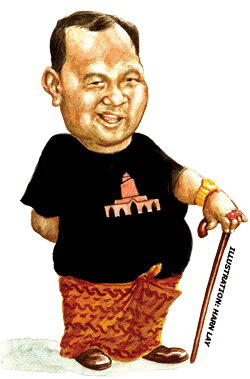 Tay Za, a 41-year-old tycoon, is one of them. And he is still going strong.
Tay Za, a 41-year-old tycoon, is one of them. And he is still going strong.As a symbol of his wealth, the young businessman now enjoys driving an expensive American-made Hummer, the civilian version of the military Humvee, on Rangoon roads.
Local publications were not allowed to carry stories about Tay Za’s new vehicle. Burma’s notorious censor board axed the Hummer story. There is no clear answer why, but business sources and well-informed editors in Rangoon say Tay Za was one of only two in the country who bought Hummers, the other being regime supremo Snr-Gen Than Shwe’s son, Kyaing San Shwe. Therefore, such a story with a link to Burma’s first family would be sensitive.
Indeed, the young tycoon’s close ties to Than Shwe’s family remain the talk of the town. He is also close to family members of some other high-ranking officials. But his business links with Than Shwe and others in the upper echelons, in particular, have been carefully watched by some rival groups, notably by junta number two Deputy Snr-Gen Maung Aye, according to military sources.
Late this year, Tay Za’s office was randomly searched, and he was rumored to have been taken for interrogation, presumably without Than Shwe’s go-ahead. Business sources and political observers are now saying that if Than Shwe retires, Tay Za and his company’s future are uncertain. Company sources say he and his family feel uneasy about being associated with Than Shwe’s family.
Tay Za is president and managing director of the Htoo Trading Company, a major player in a wide area of Burmese business and industrial activities, ranging from the hotel and tourism trade to arms imports.
Htoo Trading is involved in timber, transport, tourism, construction, property development, palm oil production and arms deals. This year he set up his own domestic airline, Air Bagan. As the list of his company’s interests has grown impressively, so has its earnings. Tay Za’s tycoon status has not only financed his lavish lifestyle, but it has given him easy access to the top echelons of power.
 Yin Yin Khine [Athlete]
Yin Yin Khine [Athlete]Burma’s 400-meter track star recovered from an injury she sustained at last year’s Southeast Asian Games to win gold at the 2005 event in the Philippines. It was Burma’s fourth gold medal at the games.
Two years ago, Yin Yin Khine won two gold medals at the 2003 Asian track and field championships.
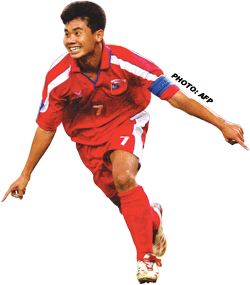 Soe Myat Min [Athlete]
Soe Myat Min [Athlete]Although Burma’s national football team is currently performing below form, its captain, Soe Myat Min, 23, enjoys huge popularity at home and wide recognition on the region’s playing fields. In the Tiger Cup contest in Malaysia this year, he was named most popular player, after winning 43.7 percent of the votes cast in an internet poll. In 2002, Soe Myat Min, who is from Rangoon’s Hmaw Be Township, was singled out as Burma’s best footballer by the Myanmar [Burma] National Olympic Council.